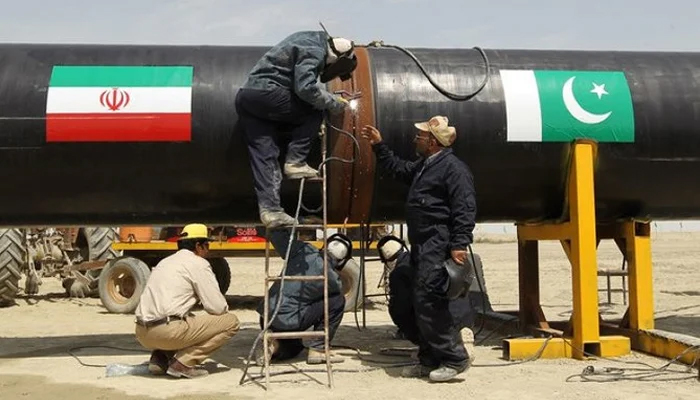Pakistan, Iran agree to develop gas pipeline implementation plan
Energy Minister says, “We have held constructive talks in Tehran and Pakistan has renewed its commitment to the project"
ISLAMABAD: In a major development, Pakistan and Iran have reached an agreement on active engagements to jointly develop a consensus implementation plan for the Iran-Pakistan (IP) gas pipeline. The negotiations in this context would begin in the next two to three weeks.
Despite this, the Iranian deadline to move international arbitration by September 2024 would remain in the field allowing that much time to explore bilateral avenues.
Energy Minister Muhammad Ali told The News, “We have held constructive talks in Tehran and Pakistan has renewed its commitment to the project.
We have convinced the neighbouring country of our deficient energy status for which we also have enhanced work on the TAPI gas line project. The Iranian side listened to us carefully and agreed to increase active engagements to enable the IP project.”
During the talks, the Iranian side also offered to export more electricity to Pakistan for Gwadar and Chaman and Pakistan agreed to consider that. Pakistan is already importing 104 MW of electricity from Iran.
Muhammad Ali said in his view Pakistan needs more electricity from Iran for Gwadar, of course on a better negotiated tariff. Though China is setting up an imported coal-based 300MW power plant at Gwadar yet it may not fulfil the future needs. Once the national grid gets installed at Gwadar, Pakistan can also use more Iranian electricity for its national use, the minister said.
When the energy minister was asked about the gas project and the issue of $18 bn penalties, the minister said that both countries have decided to explore ways to implement the project.
The Inter-State Gas Systems of Pakistan and the National Iranian Gas Company signed a revised agreement in September 2019 for the pipeline.
This accord stipulated that Iran would not approach any international court for any delay till 2024 but would be free to do so afterwards. Pakistan could not build the pipeline primarily due to the risk of US sanctions that any project with Iran would invite.
During the talks, the Iranian side was of the view that there could be no US sanctions as it was already exporting gas to Azerbaijan and Turkmenistan, which have not been exposed to any sanctions. The same would hold good for Pakistan in that scenario.
-
 Kanye West's Last Measure To Save Bianca Censori Marriage As He Tries To Salvage Image
Kanye West's Last Measure To Save Bianca Censori Marriage As He Tries To Salvage Image -
 Kim Kardashian Finally Takes 'clear Stand' On Meghan Markle, Prince Harry
Kim Kardashian Finally Takes 'clear Stand' On Meghan Markle, Prince Harry -
 Christina Applegate Makes Rare Confession About What Inspires Her To Keep Going In Life
Christina Applegate Makes Rare Confession About What Inspires Her To Keep Going In Life -
 Patrick J. Adams Shares The Moment That Changed His Life
Patrick J. Adams Shares The Moment That Changed His Life -
 Selena Gomez Getting Divorce From Benny Blanco Over His Unhygienic Antics?
Selena Gomez Getting Divorce From Benny Blanco Over His Unhygienic Antics? -
 Meet Arvid Lindblad: Here’s Everything To Know About Youngest F1 Driver And New Face Of British Racing
Meet Arvid Lindblad: Here’s Everything To Know About Youngest F1 Driver And New Face Of British Racing -
 At Least 30 Dead After Heavy Rains Hit Southeastern Brazil, 39 Missing
At Least 30 Dead After Heavy Rains Hit Southeastern Brazil, 39 Missing -
 Courtney Love Recalls How ‘comparison’ Left Marianne Faithfull ‘broken’
Courtney Love Recalls How ‘comparison’ Left Marianne Faithfull ‘broken’ -
 Pedro Pascal Confirms Dating Rumors With Luke Evans' Former Boyfriend Rafael Olarra?
Pedro Pascal Confirms Dating Rumors With Luke Evans' Former Boyfriend Rafael Olarra? -
 Ghost's Tobias Forge Makes Big Announcement After Concluding 'Skeletour World' Tour
Ghost's Tobias Forge Makes Big Announcement After Concluding 'Skeletour World' Tour -
 Katherine Short Became Vocal ‘mental Illness’ Advocate Years Before Death
Katherine Short Became Vocal ‘mental Illness’ Advocate Years Before Death -
 SK Hynix Unveils $15 Billion Semiconductor Facility Investment Plan In South Korea
SK Hynix Unveils $15 Billion Semiconductor Facility Investment Plan In South Korea -
 Buckingham Palace Shares Major Update After Meghan Markle, Harry Arrived In Jordan
Buckingham Palace Shares Major Update After Meghan Markle, Harry Arrived In Jordan -
 Demi Lovato Claims Fans Make Mental Health Struggle Easier
Demi Lovato Claims Fans Make Mental Health Struggle Easier -
 King Hospitalized In Spain, Royal Family Confirms
King Hospitalized In Spain, Royal Family Confirms -
 Japan Launches AI Robot Monk To Offer Spiritual Guidance
Japan Launches AI Robot Monk To Offer Spiritual Guidance




